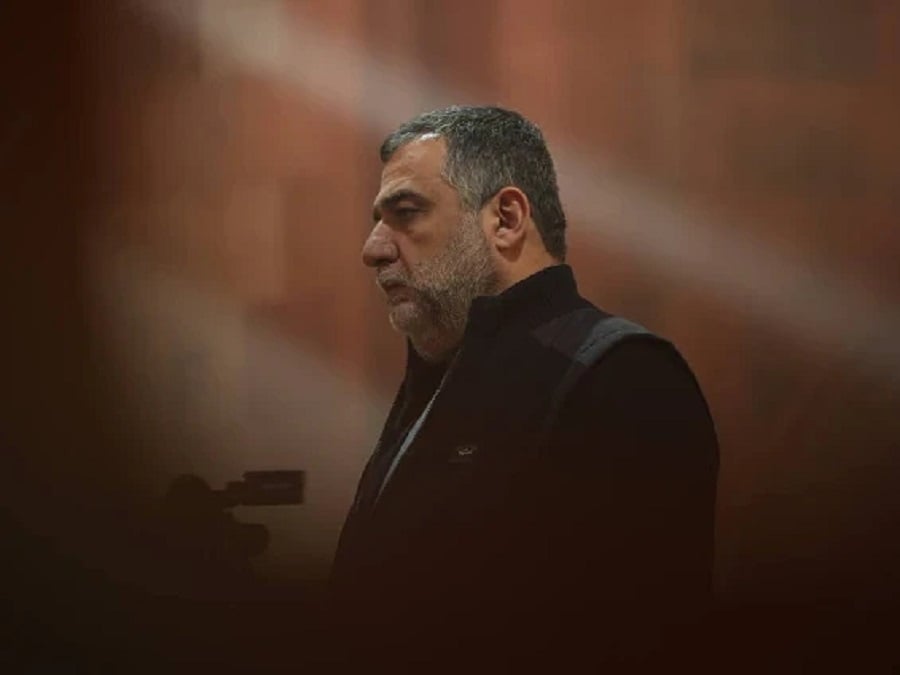Christian Solidarity International. Human rights experts have demanded that Azerbaijan release all the Armenian detainees in its custody, among them a former minister in the Nagorno Karabakh government, Ruben Vardanyan. Vardanyan’s son, David, is now calling on President Trump to become involved.
Vardanyan, who was captured in 2023, has become a key face of the resistance against Azerbaijan while facing brutal conditions with his fellow Armenian prisoners in Baku. photo: free armenian prisoners
In a moving appeal, David Vardanyan, son of imprisoned businessman Ruben Vardanyan, has called on US President Donald Trump to use his political influence to secure the release of his father and other Armenian prisoners from Azerbaijani detention.
“My dad has been in prison for more than 550 days simply for being Christian,” reads the title of the opinion article published by Fox News. In it, David Vardanyan reminds the president of his promise to “protect persecuted Armenian Christians in Azerbaijan and beyond” and urges him to pressure the regime in Baku to release the detainees.
Read also
Ruben Vardanyan, an influential businessman and philanthropist who served as State Minister of Nagorno Karabakh from November 2022 to February 2023, is on trial in Baku.
Captured by Azerbaijani forces during the ethnic cleansing of Nagorno Karabakh, Vardanyan faced terrorism-related charges from the outset. But in December 2024, Baku prosecutors filed dozens of new charges, reported to include “separatism” and embezzlement, against the former minister. If convicted, Vardanyan faces the grim prospect of life imprisonment. He firmly rejects the charges against him.
Alarming revelations at UN special event
The Vardanyan case is just the tip of the iceberg. According to human rights organizations, at least 23 Armenians are known to be in Azerbaijani custody, including eight current and former leaders from Nagorno Karabakh. Particularly alarming: At least 80 more people are considered forcibly disappeared.
Human rights experts describe these prisoners as “hostages” being used by Azerbaijan as bargaining chips in ongoing peace negotiations with Armenia. A recently presented draft peace treaty between Baku and Yerevan does not include provisions for the release of these prisoners, which has drawn harsh criticism from the Armenian opposition.
Torture and mistreatment behind closed doors
At a special event on the sidelines of the 58th session of the UN Human Rights Council in Geneva, organized by Christian Solidarity International (CSI), shocking details about the detention conditions of Armenian prisoners came to light. Dr. Joel Veldkamp, CSI’s director of public advocacy, moderated the discussion.
Reports from detainees who have already been released point to the systematic abuse of the hostages: beatings, mock executions, and constant physical and psychological abuse are said to be commonplace. “Even in the published video footage of the trials currently taking place in Baku, the evidence of abuse is visible on the faces of these men,” explained Arpine Avetisyan, an international human rights lawyer.
The situation of the prisoners has dramatically worsened after Azerbaijan prohibited the International Committee of the Red Cross (ICRC) – the only external organization with access to the prisoners – from continuing its activities in the country. This eliminated the last independent monitoring possibility.
Show trials instead of rule of law
Currently, sixteen of the 23 imprisoned Armenians are facing a military court in Baku. “These men were sitting at the negotiating table. They were part of an internationally led diplomatic process. And now they are charged as terrorists,” said Philippe Kalfayan, former Secretary General of the International Federation for Human Rights.
The charges range from genocide to terrorism. At the CSI event, Siranush Sahakyan, a human rights lawyer representing the families of the detainees before the European Court of Human Rights, described the Azerbaijani justice system as “one of the least independent and most corrupt in the world.”
“There is no scenario in which an Azerbaijani judge operating in an environment of systemic anti-Armenian sentiment could deliver an impartial ruling,” she stated before the assembled international experts and diplomats.
The trials are conducted under strict control measures and behind closed doors. The goal is to solidify the Azerbaijani narrative of the conflict and to silence critical voices. The panel members called for the release of the detainees. In a message sent by video, Lord David Alton joined this call.
Sharp criticism of UN Working Group
A particularly explosive aspect of the CSI event was the sharp criticism of a recently published report by the UN Working Group on Arbitrary Detention regarding the case of Ruben Vardanyan. The Working Group had found no arbitrary detention – an assessment that met with “strong opposition” from the panelists.
The experts criticized the statement for ignoring the broader context of the conflict and for contradicting numerous international reports documenting ethnic discrimination against Armenians in Azerbaijan. They stressed that Azerbaijan was misinterpreting the statement to support the legitimacy of the court proceedings while the humanitarian tragedy continues.
The human cost of an ethnic and religious conflict
The case of Armenian prisoners critically examined during the CSI event is inseparably linked to the forced expulsion of the entire Armenian population from Nagorno Karabakh (Artsakh) in September 2023. After a three-year struggle, which included two major military attacks and a nine-month blockade, the Armenian-Christian population was driven from their historical homeland.
As diplomatic efforts continue, the significant international response to the CSI event shows that the prisoners have not been forgotten. For David Vardanyan and the families of the other detainees, one thing is clear: International pressure must be maintained before it is too late.






















































